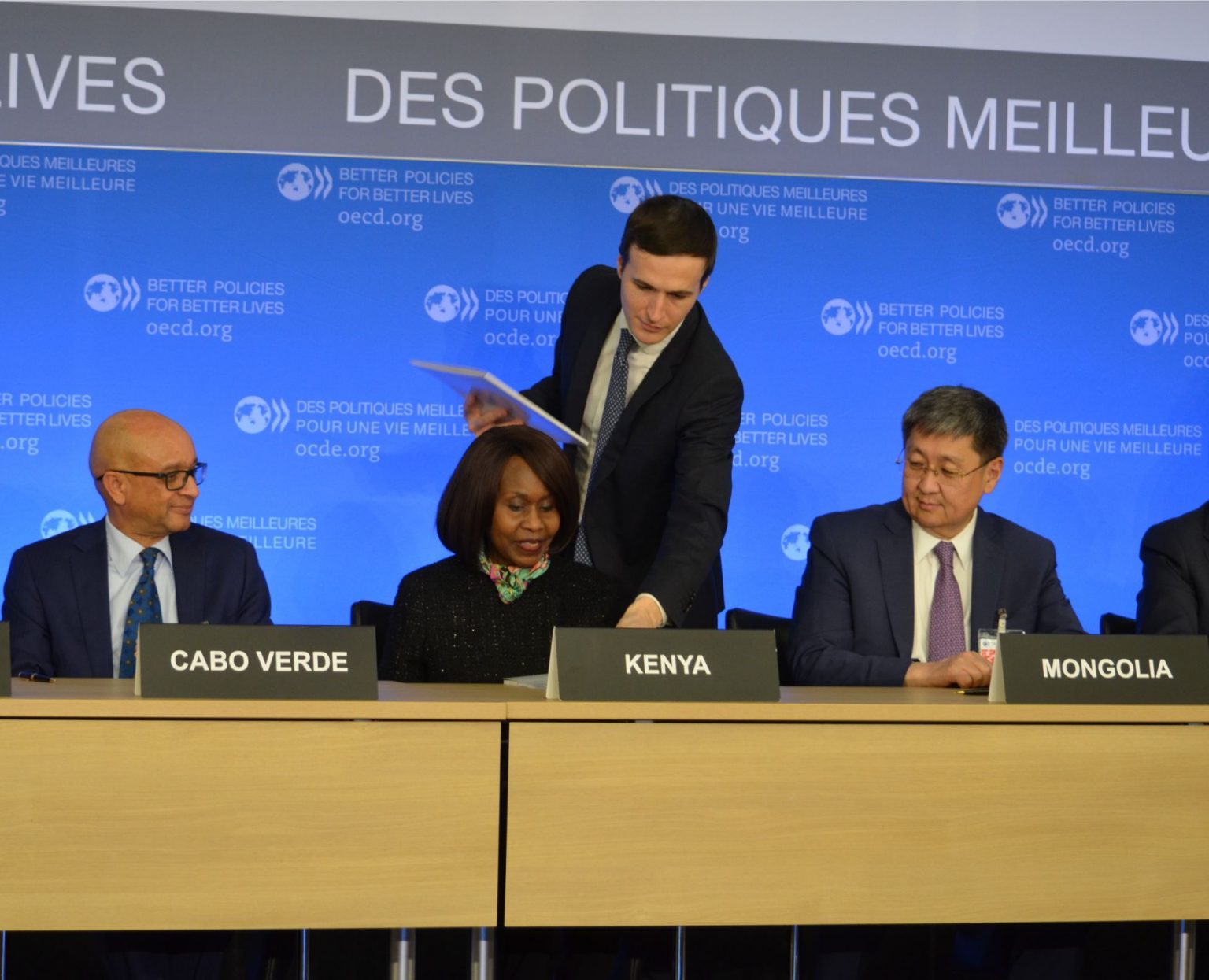Kenya has become one of the latest countries to strengthen the fight on tax evasion and profit shifting with signing of a tax treaty, in the wake of rising malpractices by global multi-nationals.
The national efforts to strengthen the country’s bilateral tax treaties, have received a boost with the signing of a multilateral convention to end tax avoidance in France.
This week, the country signed the Multilateral Convention to Implement Tax Treaty Related Measures to Prevent Base Erosion and Profit Shifting Convention at the 10th Anniversary Meeting of the Global Forum on Transparency and Exchange of Information for Tax Purposes (the Global Forum) in Paris.
The Convention is the first multilateral treaty of its kind, allowing international collaboration initiatives to end tax avoidance among multinational firms under the OECD/G20 BEPS Project.
READ ALSO:Kenya’s tax evaders put on notice by President Kenyatta
The OECD/G20 BEPS Project delivers solutions for governments to close the gaps in existing international rules that allow corporate profits to “disappear” or be artificially shifted to low or no tax environments, where companies have little or no economic activity.
Under the OECD/G20 Inclusive Framework on BEPS, over 130 countries are collaborating to put an end to tax avoidance strategies that exploit gaps and mismatches in tax rules to avoid paying tax.
READ ALSO:KRA steps up war against tax evasion
The Treaty
Kenya’s Ambassador to France Judi Wakhungu signed the Convention at a ceremony held in Paris and witnessed by officials from the National Treasury and the Kenya Revenue Authority (KRA).
By signing the international tax treaty, Kenya now becomes the 91st jurisdiction to join the Convention which covers over 1,600 bilateral tax treaties and seeks to put an end to tax avoidance strategies that exploit gaps and mismatches in tax rules to avoid paying tax.
READ ALSO:Africa renews fight on tax and financial crimes
Speaking at the signing ceremony at the Organisation for Economic Co-operation and Development (OECD) headquarters, Wakhungu said Kenya’s signing of the Convention demonstrates the national commitment to put in place measures to Prevent Base Erosion and Profit Shifting (BEPS).
The signing further confirms that Kenya would also be swiftly moving to deposit the Country’s Instrument of Ratification for the Convention in coming months.
The Convention, according to the ambassador, will work to strengthen the existing international tax treaties network by ensuring that issues of treaty abuse are addressed, dispute resolution is strengthened.
“This will ultimately ensure that Kenya gets her fair share of taxes from multinational firms operating in the country,” an official communiqué reads in part.
Base Erosion
According to the OECD, Base Erosion and Profit Shifting (BEPS) practices cost countries $100-$240 billion in lost revenue annually, which is the equivalent to 4-10% of the global corporate income tax revenue.
“The Global Forum has been a game-changer,” said OECD Secretary-General Angel Gurría, “Thanks to international co‑operation, tax authorities now have access to a huge trove of information that was previously beyond reach.”
“Tax authorities are talking to each other and taxpayers are starting to understand that there’s nowhere left to hide. The benefits to the tax system’s fairness are enormous,” Gurría added.
On his part, KRA Commissioner General Githii Mburu said the signing of the Convention would put a stop to treaty shopping tendencies which have has been a major concern for many countries as it promotes double non-taxation.
READ ALSO:Kenya and Portugal sign pact to avoid double taxation
Treaty shopping, in particular, is estimated to reduce the effective withholding tax rate by more than five percentage points from nearly eight per cent to three per cent, generating large revenue losses for developed and developing countries alike.
“The modifications introduced by the Convention serve to protect our treaty network by countering treaty shopping, and ensuring that income will be taxed in at least one of the partner states,” Mburu said.
OECD
At the diplomatic level, Prof Wakhungu commended the OECD for continued technical and related support which has served to foster world-class tax administration in Kenya. OECD has been working closely with Kenya on several initiatives.
Wakhungu said: “We, therefore, congratulate the OECD for spearheading the development of this very efficient instrument to ensure that treaty-related measures to prevent BEPS are swiftly implemented.”
“The Convention has not only presented a platform to amend our existing treaties, but its provisions have also been incorporated in the current treaties being negotiated. Kenya remains committed to the work of the Inclusive Framework and reaffirms her commitment to implementing the BEPS minimum standards,” she added.
he Convention became effective on January 1, 2019 and now applies to 99 tax treaties concluded among the 37 jurisdictions that have already deposited their instrument of acceptance, approval or ratification.
Domestic tax base erosion and profit shifting (BEPS) due to multinational enterprises exploiting gaps and mismatches between different countries’ tax systems affect all countries.
Developing countries’ higher reliance on corporate income tax means they suffer from BEPS disproportionately.
READ ALSO:WEAK TREATIES SHOULD BE REVOKED BY GOVERNMENTS, SAYS CIVIL SOCIETIES IN UGANDA
Working together in the OECD/G20 Inclusive Framework on BEPS, over 130 countries are implementing 15 Actions to tackle tax avoidance, improve the coherence of international tax rules and ensure a more transparent tax environment.
Tax transparency is particularly important for developing countries. With support from the Global Forum, 85 developing country members have used the exchange of information to strengthen their tax collection capacity.
The Africa Initiative has helped African members identify over EUR 90 million in additional tax revenues in 2018, thanks to information exchanges and voluntary disclosures.
To improve developing countries’ uptake of automatic exchange of financial information, the OECD-UNDP Tax Inspectors Without Borders Initiative has launched a pilot project aimed at supporting the effective use of the data.
